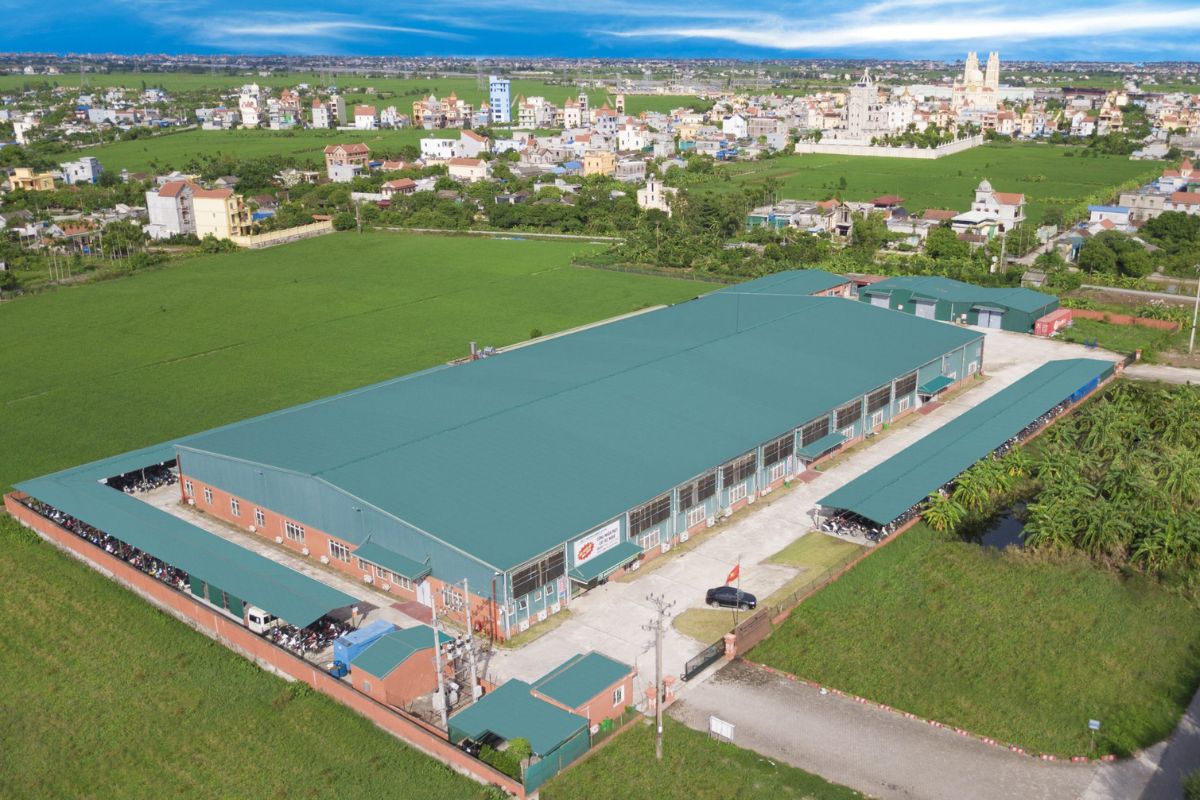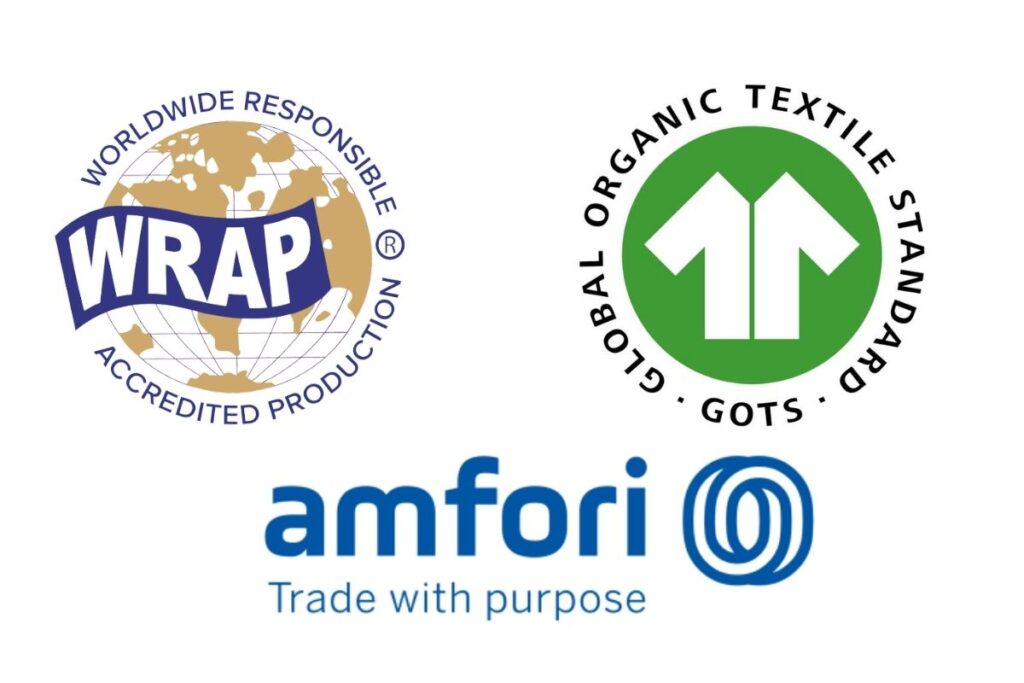In the garment industry, certifications like BSCI, WRAP, and GOTS are crucial in shaping how factories operate and brands manage sourcing. Each standard addresses different aspects of responsible production, yet they all reinforce the same goal: safer workplaces, fair treatment, and lower environmental impact.
For companies under pressure to meet buyer expectations and regulatory demands, these global certificate programs offer a framework for accountability. The sections ahead unpack what each certification covers and why they matter for sustainable sourcing.
What is BSCI certification?
Amfori BSCI (formerly the Business Social Compliance Initiative BSCI) is an industry-driven auditing framework for improving factory working conditions and labor rights in global supply chains. Launched by the Foreign Trade Association in 2003, amfori BSCI provides companies with a systematic approach to monitor and enhance social performance among their suppliers. By participating in BSCI, companies commit to continuous social compliance improvements and cascading these standards throughout their supply chain.
Its Code of Conduct is based on international conventions (ILO, UN, OECD guidelines) and centers on 11 core principles that cover:
- Freedom of association and collective bargaining
- Fair remuneration
- No discrimination
- Decent working hours
- Occupational health & safety
- No child labor
- No precarious employment
- No bonded labor
- Special protection for young workers
- Protection of the environment
- Ethical business behavior.
Benefits of working in a BSCI-Compliant company
Sourcing from BSCI-compliant manufacturers offers clear benefits for brands and suppliers:
- Ethical business practices: BSCI requires fair wages, safe conditions, and no exploitation. This ensures suppliers follow humane and business practices that protect worker welfare.
- Reduced supply chain risks: BSCI compliance helps prevent labor disputes and disruptions, giving brands greater supply stability and fewer compliance crises.
- Meeting consumer expectations: Working with ethical factories lets brands demonstrate transparency and responsibility. This aligns with consumers’ growing demand for socially conscious sourcing.
- Sustainability goals: BSCI encourages environmental responsibility, pushing suppliers to minimize waste and impact.
The amfori BSCI Code of Conduct
The amfori BSCI Code of Conduct is grounded in six core values:
- Continuous Improvement
- Cooperation
- Empowerment
- Code Observance
- Protection of Vulnerable Persons
- Transparency
These values are implemented through 11 guiding principles that shape the expectations for responsible business behavior.
The amfori BSCI audit process
BSCI compliance is verified through a detailed audit process consisting of five main steps:
- Opening Meeting: The auditor meets factory management to explain the audit scope and BSCI requirements. They present the amfori BSCI Code of Conduct and relevant legal standards against which the facility will be assessed.
- Site Tour: The auditor tours the production site to observe physical conditions and workplace practices in real time. They check fire safety, machine guards, cleanliness, and worker interactions.
- Interviews: Next, the auditor conducts confidential interviews with managers and employees. Management interviews clarify the factory’s policies and procedures (e.g., HR, health and safety, quality control procedures implemented, etc.). In contrast, worker interviews (individual and group) provide insight into actual working conditions and grievances.
- Review of records: The auditor reviews documents and records to cross-check compliance. This includes payroll records, working hour logs, employment contracts, age verification records, permits, and existing social compliance certificates or past audit reports.
- Closing meeting: Finally, the auditor holds a meeting with management to discuss findings. Any non-compliances are presented along with their root causes. The auditor typically issues a Corrective Action Plan (CAP), which management must sign off on, agreeing to address issues within set timelines. This cooperative discussion ensures transparency and commitment to improvement.
After the audit, the factory and the BSCI members work together to remediate any issues found. The framework emphasizes continuous improvement. Suppliers are expected to address shortcomings and strengthen their systems over time.
What is WRAP certification?
WRAP (Worldwide Responsible Accredited Production) is the world’s largest independent certification program for apparel, footwear, and sewn products. A WRAP certificate verifies that a manufacturing facility operates under lawful, humane, and ethical conditions. The WRAP compliance program is built on 12 Principles that ensure compliance with labor laws, no forced or child labor, fair compensation, health and safety standards, and environmental practices.
Benefits of WRAP certification
Achieving WRAP certification leads to tangible improvements for factories and assurance for brands:
- For manufacturers, WRAP’s emphasis on worker well-being can boost productivity and product quality. Factories often see higher morale and lower staff turnover by fixing safety issues and treating employees with dignity.
- WRAP’s ethical requirements strengthen a supplier’s reputation and standing in the garment industry. This global certificate signals clients that the factory’s business practices meet internationally recognized benchmarks.
- For brands and retailers, sourcing from WRAP-certified facilities provides added confidence and legal protection. It reduces the risk of scandals, costly product recalls, or labor lawsuits by ensuring compliance with stringent 12-point standards.
- WRAP certification can improve supply chain reliability. Certified factories are regularly audited, encouraging consistent adherence to good practices and minimizing disruptions due to compliance issues.
Levels of WRAP certification
WRAP awards three levels of certification to factories, based on the degree of compliance with its 12 Principles:
- Silver: Valid for 6 months. Awarded to facilities that demonstrate substantial compliance with WRAP’s requirements and only minor non-compliances.
- Gold: A Gold certificate signifies that the factory meets the complete set of WRAP’s lawful, ethical, and safety criteria. It’s valid for one year.
- Platinum: This is the highest level, reserved for facilities that have achieved Gold certification for three consecutive audits. It is valid for 2 years.
What is GOTS certification?
GOTS (Global Organic Textile Standard) is the world’s leading standard for processing textiles made with organic fibers. GOTS is a comprehensive certification covering the entire production process from field to finished product. It ensures that textiles are truly organic (meeting strict material thresholds) and are produced in an environmentally and socially responsible way.
For consumers and brands, the GOTS logo assures that a textile product is sustainable and made under humane working conditions, not just at the farm, but through every step of production.
Criteria of GOTS certification
GOTS has rigorous criteria spanning the garment manufacturing process. This ensures sustainability and ethics at every stage. Key requirements include:
- Organic fiber content: Products must contain a high percentage of certified organic fibers – at least 70% to be labeled “made with organic”, or 95% or more to carry the label “organic”.
- Chemical restrictions: GOTS prohibits using toxic chemicals such as azo dyes, heavy metals, and formaldehyde in processing.
- Environmental management: Certified facilities must implement environmental policies and procedures. This includes proper waste management, recycling, and efficient water and energy use.
- Social and labor standards: GOTS incorporates essential social criteria besides environmental rules. Factories must comply with the International Labour Organization’s key conventions.
- Labelling and certification: Every stage of the supply chain, from fiber producers, spinning mills, dyeing units, to sewing factories and traders, must be certified by an approved independent body.
Benefits of GOTS certification
Adopting GOTS changes how companies manage risk, credibility, and market access. The advantages touch every part of the apparel business.
- Companies working under GOTS reduce their exposure to risk because the standard enforces strict social and environmental rules. Instead of reacting to problems, brands can prevent them.
- Independent third-party audits provide real credibility. Buyers and investors don’t have to rely on promises – they see verified proof that “organic” claims and fair labor practices hold up.
- Traceability improves as well. Every fiber is tracked from origin to finished garment, saving brands the cost and effort of piecing together records independently.
- Cleaner manufacturing processes often lead to efficiency gains. Better wastewater treatment and higher social compliance standards mean factories operate more smoothly, with fewer interruptions and healthier staff.
- Perhaps the clearest benefit is in market access. More retailers and procurement programs now require GOTS certification, so certified suppliers secure opportunities in the sustainable apparel market that uncertified ones may lose.
As global standards like BSCI, WRAP, and GOTS reshape expectations in the garment industry, factories are adapting to prove compliance, protect workers, and limit environmental impact. Kiara Garments from Capital World Group in Vietnam supports that shift through a vertically integrated model that covers design, sampling, scalable production, and certified fabrics.

Recognized as one of the trusted Vietnamese textile manufacturers, Capital World Group helps brands achieve faster timelines, cost efficiency, and verified ethical production backed by ISO 9001, Higg FEM, amfori BSCI, and SLCP. Contact us at Capital World Group today to explore our sustainable garment manufacturing in Vietnam.

